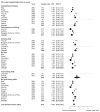What Are Effective Program Characteristics of Self-Management Interventions in Patients With Heart Failure? An Individual Patient Data Meta-analysis
- PMID: 27374838
- PMCID: PMC5180428
- DOI: 10.1016/j.cardfail.2016.06.422
What Are Effective Program Characteristics of Self-Management Interventions in Patients With Heart Failure? An Individual Patient Data Meta-analysis
Abstract
Background: To identify those characteristics of self-management interventions in patients with heart failure (HF) that are effective in influencing health-related quality of life, mortality, and hospitalizations.
Methods and results: Randomized trials on self-management interventions conducted between January 1985 and June 2013 were identified and individual patient data were requested for meta-analysis. Generalized mixed effects models and Cox proportional hazard models including frailty terms were used to assess the relation between characteristics of interventions and health-related outcomes. Twenty randomized trials (5624 patients) were included. Longer intervention duration reduced mortality risk (hazard ratio 0.99, 95% confidence interval [CI] 0.97-0.999 per month increase in duration), risk of HF-related hospitalization (hazard ratio 0.98, 95% CI 0.96-0.99), and HF-related hospitalization at 6 months (risk ratio 0.96, 95% CI 0.92-0.995). Although results were not consistent across outcomes, interventions comprising standardized training of interventionists, peer contact, log keeping, or goal-setting skills appeared less effective than interventions without these characteristics.
Conclusion: No specific program characteristics were consistently associated with better effects of self-management interventions, but longer duration seemed to improve the effect of self-management interventions on several outcomes. Future research using factorial trial designs and process evaluations is needed to understand the working mechanism of specific program characteristics of self-management interventions in HF patients.
Keywords: Heart failure; individual patient data meta-analysis; self-management.
Copyright © 2016 The Author(s). Published by Elsevier Inc. All rights reserved.
Conflict of interest statement
The authors declare the following interests: this work was supported by a grant from The Netherlands Organisation for Health Research and Development, ZonMw (grant number 520001002). DAD reports grants from NIH during the conduct of the study, outside the submitted work. MH reports grants from MDRTC during the conduct of the study, outside the submitted work. RTT reports investigator-initiated grants from Merck Canada Inc., AstraZeneca Canada, and personal fees from Merck Canada Inc., all outside the submitted work. The other authors declare no conflict of interest.
Figures
Comment in
-
"Usual" Yet Not Uniform Care Limits Our Understanding of Trials of Self-Management Interventions in Heart Failure.J Card Fail. 2016 Nov;22(11):872-874. doi: 10.1016/j.cardfail.2016.09.003. Epub 2016 Sep 8. J Card Fail. 2016. PMID: 27615063 No abstract available.
References
-
- Barlow J, Wright C, Sheasby J, Turner A, Hainsworth J. Self-management approaches for people with chronic conditions: a review. Pat Educ Couns. 2002;48:177–187. - PubMed
-
- Ditewig JB, Blok H, Havers J, van Veenendaal H. Effectiveness of self-management interventions on mortality, hospital readmissions, chronic heart failure hospitalization rate and quality of life in patients with chronic heart failure: a systematic review. Patient Educ Couns. 2010;78:297–315. doi: 10.1016/j.pec.2010.01.016. - DOI - PubMed
Publication types
MeSH terms
Grants and funding
LinkOut - more resources
Full Text Sources
Other Literature Sources
Medical
Research Materials
Miscellaneous


